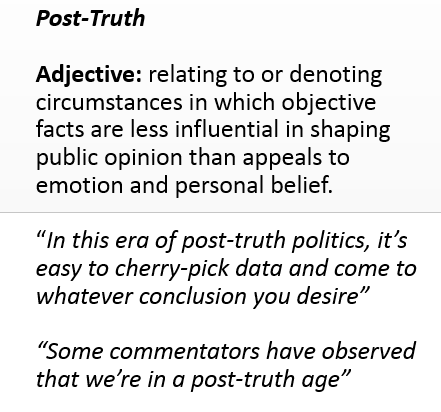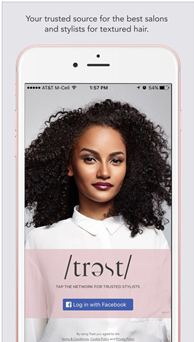It’s no news that ‘Trust’ and ‘Authenticity’ are key words for the modern consumer. Where once we looked to traditional authority figures for advice and information, we moved on to ‘people like me’ on social media for recommendations, believing them to be more authentic, genuine and tailored to our own interests. For the first time in a long time, peers became as credible as experts. However, our trust in influencers has lowered significantly since we learnt of fake endorsements and sponsorships, designed to earn them money rather than our respect.
The abundance of ‘fake news’ articles flooding the internet is also making consumers question information. When even trusted media publications are sharing fake news stories to gain in likes and shares – where do we turn to for genuine facts? The consumer now has to consider multiple questions when assessing information to determine its trustworthiness. Reviews – are they accurate? The news – are facts checked? The people seemingly like me on social media – are they genuine?
As a response, we’re seeing consumers re-assessing where they place their trust. We’re now looking to build or use close personal relationships for recommendations rather than unknown or untrusted sources.
POST- TRUTH AND FAKE NEWS
In 2016, the Oxford Dictionary labelled ‘post-truth’ the word of the year, stemming from the abundance of fake news believed and shared.
Now news content is widely accessible for free, paid-for news is in decline. To make money, newspapers need to score more eyeballs on the screen to sell ad space – leaving publications with a problem, and fake news the solution.
These articles bring in shares and likes through outlandish storylines or shock value. Recognising this is an opportunity to make money, trusted news sources became lax in their fact-checking, and ultimately sharing either wholly fake articles or stories slanted to heighten an outrageous or shocking aspect to gain traction.
Fake news widely shared last year, claiming Trump called Republicans ‘the dumbest group of voters in the country.’
As we’ve seen recently on our Illume Network of leading-edge consumers, this has come to the forefront of consumer consciousness and concern – particularly after the UK Brexit vote and the US Elections – where fake news has been argued to significantly impact political votes. With even newspapers now publishing fake news, how do consumers differentiate between fact and fiction?
PARADOX OF CHOICE
Another complexity of decision making is the sheer amount of choice out there. As modern consumers, we want to feel like we’ve made an informed, savvy decision when we purchase a product. This includes reading product reviews, comparing prices, comparing brands etc.
Whilst the ability to check facts, research products and find recommendations instantaneously was previously seen as useful, now most view it as a chore with 66% of Brits agreeing ‘the internet creates more choice than I need or want.’
Influencers were once useful in cutting through all this content. Finding a person relatable to you with similar needs allowed consumers to accept their reviews, knowing if it works for the influencer, it’ll probably work for them too. But with increasing exposure to influencers who are only in it for the cash, we’re now holding back our trust. With brands now even recruiting ‘micro-influencers’, it’s hard to determine who’s genuine online.
WHO DO WE TRUST?
In response, we’re seeing consumers being more exclusive in their information sources. Through our Illume Network, we’re noticing consumers are seeking out recommendations from either close family or friends, or from accessible and personal industry experts.
Trust is increasingly about tapping into and utilising a close relationship and having one-on-one conversations on a human level. This is where we’re seeing consumers looking more towards those closest to them – family, friends, close colleagues etc. This way, the information received is of better quality, more personal and relevant, making decisions faster and easier whilst still feeling we’ve made an educated choice. We can see this in the shift toward dark social, with people sharing links or advice in one-on-one chats, rather than to the masses on social media. We’re recognising the value in close conversations with trusted individuals, rather than shouting our questions out to the world and hoping to receive a satisfactory response.
Some brands are already tapping into these personal connections and their associated trust. An example of this is new hair styling app Trest, described as ‘like getting advice from your 200 closest girlfriends’, the app syncs with social media accounts to see friend recommendations and reviews, in order to match you with the best salons and stylists in the city. The app is using personal, trusted connections to bring consumers into the relevant stores for them.
Another way consumers are looking for advice is from credible, accessible experts – those in the industry who are experienced and knowledgeable enough to get to know us and genuinely make the best choice for us, rather than simply trying to sell a product.
We can see this happening particularly in the world of travel. Once in decline due to DIY bookings, now many are heading to travel agents for their expert advice. Rather than researching locations online or looking through endless websites to find the best deals, we’d rather be sure of the high quality information we’re receiving – so we’re going to individuals to receive a level of understanding that a computer can’t provide. Ultimately leaving with a feeling that ‘they wouldn’t lie to me’ because of the established personal connection.
WHAT DOES THIS MEAN FOR BRANDS?
We don’t want to be lied to – and with so much false information around, it’s difficult to judge who to trust. Brands need to work hard in order to enter our now more protected trust space, whether this be tapping back into genuine word of mouth, connecting us with the opinions of a close knit-community, or providing warm, human services which facilitate this need for personal and honest recommendations.




